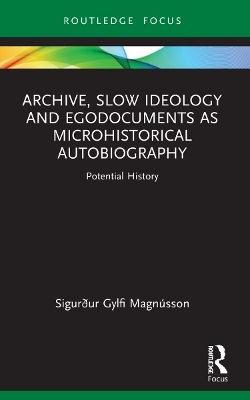
Archive, Slow Ideology and Egodocuments as Microhistorical Autobiography
Potential History
Seiten
2023
Routledge (Verlag)
978-1-032-01196-7 (ISBN)
Routledge (Verlag)
978-1-032-01196-7 (ISBN)
This book aims to demonstrate how scholars have been utilizing egodocuments and providing an opening for the multivocality of the sources to be fully appreciated. The book is based upon a photographic collection of vagabonds and outsiders that belonged to the author’s grandfather.
This book aims to demonstrate how scholars in recent times have been utilizing egodocuments from various angles and providing an opening for the multivocality of the sources to be fully appreciated. The first part of the book is concerned with the significance of egodocuments, both for the individual him/herself who creates such documents, and also for the other, who receives them. The author approaches the subject on the basis of his own personal experience, and goes on to discuss the importance of such documents for the academic world, emphasizing more general questions and issues within the fields of historiography, philosophy of history, microhistory, and memory studies. The second part of the book is based upon a photographic collection – an archive – that belonged to the author’s grandfather, who over decades accumulated photographs of vagabonds and outsiders. This part seeks to explore what kind of knowledge can be applied when a single source – an archive, document, letter, illustration, etc. – is examined, and whether the knowledge derived may not be quite as good in its own context as in the broader perspective.
This book aims to demonstrate how scholars in recent times have been utilizing egodocuments from various angles and providing an opening for the multivocality of the sources to be fully appreciated. The first part of the book is concerned with the significance of egodocuments, both for the individual him/herself who creates such documents, and also for the other, who receives them. The author approaches the subject on the basis of his own personal experience, and goes on to discuss the importance of such documents for the academic world, emphasizing more general questions and issues within the fields of historiography, philosophy of history, microhistory, and memory studies. The second part of the book is based upon a photographic collection – an archive – that belonged to the author’s grandfather, who over decades accumulated photographs of vagabonds and outsiders. This part seeks to explore what kind of knowledge can be applied when a single source – an archive, document, letter, illustration, etc. – is examined, and whether the knowledge derived may not be quite as good in its own context as in the broader perspective.
Sigurður Gylfi Magnússon is Professor of Cultural History and chair of the Department of History at the University of Iceland. He is also chair of the Center for Microhistorical Research.
Episode 1 1. The Book – The "Slow" Process of Historical Analysis 2. Family Matters – Memory and the Importance of Egodocuments Episode 2 3. Soft Spots – A Non-Autobiography 4. Potential History
| Erscheinungsdatum | 06.12.2021 |
|---|---|
| Zusatzinfo | 63 Halftones, black and white; 63 Illustrations, black and white |
| Verlagsort | London |
| Sprache | englisch |
| Maße | 138 x 216 mm |
| Gewicht | 453 g |
| Themenwelt | Geschichte ► Allgemeine Geschichte ► Neuzeit (bis 1918) |
| Geisteswissenschaften ► Geschichte ► Geschichtstheorie / Historik | |
| Geschichte ► Teilgebiete der Geschichte ► Kulturgeschichte | |
| Sozialwissenschaften ► Kommunikation / Medien ► Buchhandel / Bibliothekswesen | |
| ISBN-10 | 1-032-01196-3 / 1032011963 |
| ISBN-13 | 978-1-032-01196-7 / 9781032011967 |
| Zustand | Neuware |
| Haben Sie eine Frage zum Produkt? |
Mehr entdecken
aus dem Bereich
aus dem Bereich
Europa 1848/49 und der Kampf für eine neue Welt
Buch | Hardcover (2023)
DVA (Verlag)
48,00 €
Giordano Bruno - ein ketzerisches Leben
Buch | Hardcover (2024)
C.H.Beck (Verlag)
29,90 €


